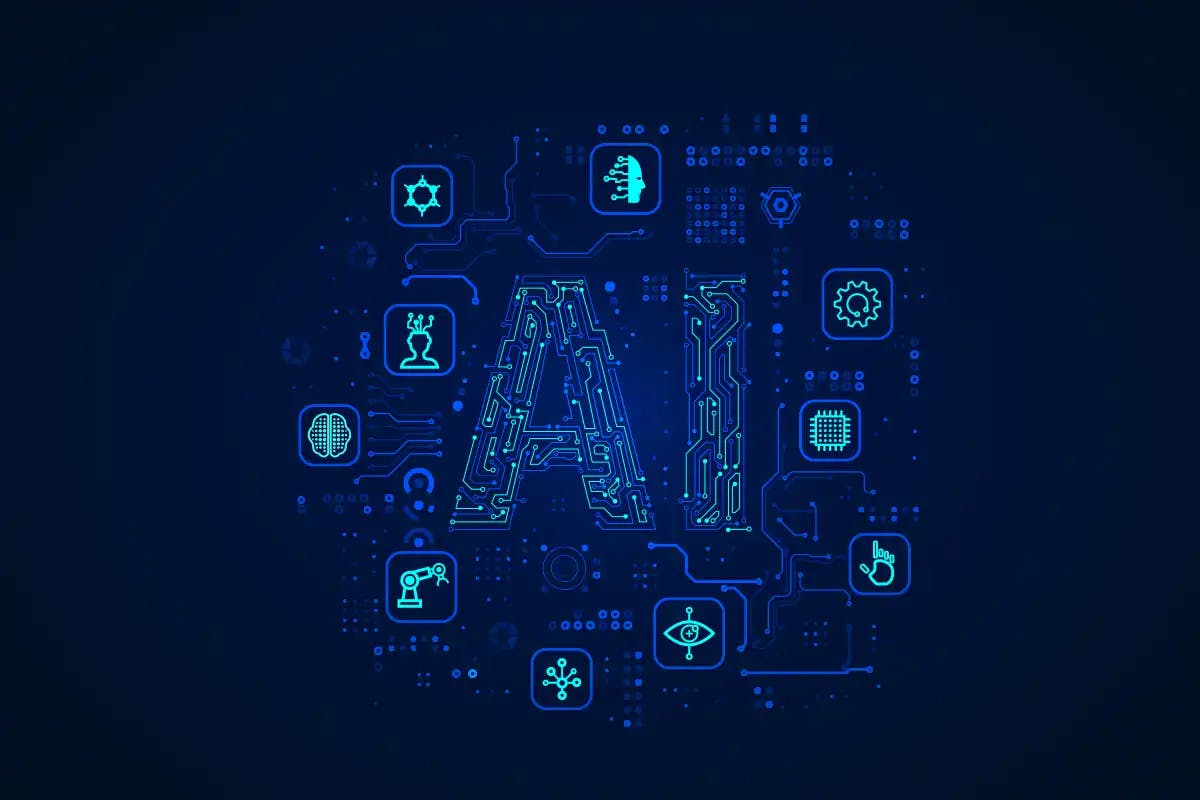


Artificial Intelligence (AI) isn't just in movies anymore. As we move through this time of business evolution, a quick overview shows that AI's role in business is growing bigger by the day. We're about to see a huge AI transformation in how businesses work, with all kinds of companies, big or small, using AI to help them do better.
If you've been paying attention to tech news, you've seen a lot of success stories about AI in Business. New and big worldwide companies are using AI to stay ahead. But with so many AI services out there, it can be confusing: Which is right for my business? How do I start using Business AI? What steps are needed to use AI in my business fully?
This guide is here to help. We'll explain AI services in simple terms. We'll talk about what they are, why they're great, and how they can help businesses make better choices. If you've wondered, "How can AI help my business decisions?" or "How does generative AI change how customers see my business?" you're in the right spot.
We'll also give tips on picking the best AI service from our experience for your business and discuss any problems you might face. If you're a business owner looking into AI or have been in business for a while and want to know more about AI's role, this guide has all the details. Come with us to learn more about AI services and see how AI could be the big change your business needs!
AI services are tools that use special rules to let machines do things we usually think only humans can do. This includes making choices, understanding language, and solving problems.
Looking into AI is like exploring a world with no end. It's not just about computers doing tasks; it's about learning, guessing, and understanding in their way. There are many types of AI, each made for different jobs. There's a wide range of AI services, from basic ones that follow set rules to more advanced ones that work like our brains. Think about tools that guess money trends or chat systems that can talk like people. We use AI daily, even if we don't always notice.
As high-ranking executives shape their organizations' vision, being well-versed in the AI development market statistics is crucial. These data points show current technological shifts, indicating AI's deep impact on industries.
Artificial Intelligence (AI) is more than just a popular topic. As businesses everywhere start to see what AI can do, it's important to know how using it can really change the way things work. Let's look at the big benefits of adding AI to your business.
Productivity is a crucial metric for businesses. The more efficiently and accurately completed tasks, the more profitable an organization becomes. AI plays a pivotal role in enhancing this efficiency.
Not using AI in your business can be a big mistake. Doing things by hand, even if it's what we're used to, takes longer and has more mistakes. Over time, this can slow things down a lot. Plus, doing the same thing all the time can make workers less excited and creative. Big bosses need to see this problem. Not using AI can slow down everyday work and stop the business from growing and doing better than others.
Enterprises ensure strategic and prosperous outcomes by harnessing data analytics, delving into predictive analysis, and mastering risk management.
Businesses ensure that every interaction is seamless, relevant, and responsive through round-the-clock customer service, tailored personalized experiences, and in-depth feedback analysis.
Online, there are so many choices. People won't put up with bad service. If they have to wait for answers, get the same stuff everyone else does, or feel ignored, they'll leave. For the big bosses, this can be a big problem. Losing one customer is bad, but with social media, one bad review can also keep many others away. It's a clear message for company leaders: not using AI to help customers isn't just about losing sales; it's about keeping the brand's good name and growing the business.
Scalability ensures businesses are ready for growth, adeptly managing big data, demonstrating adaptability, and optimizing infrastructure to seamlessly navigate the complexities of expanding markets.
Things can get tricky if a business tries to grow without AI. With more data from bigger operations, things can start to go wrong. Picture an online store during a big sale. With AI's help, more orders at once could speed everything down, or the site might crash. And if a business wants to sell new products or move into new areas, not having a flexible system could mean they must make big changes. Also, without AI helping manage online traffic, too many visitors could slow down a website or app. For the people in charge, these are more than just little problems. They affect how customers see and trust their brand. That's why AI is important to ensure things keep running smoothly as the business grows.
AI is not just a technological upgrade; it's a strategic tool that can transform businesses, driving efficiency, enhancing decision-making, and ensuring unparalleled customer experiences. As AI advances, its benefits for businesses are bound to multiply.
Picking an AI service is like choosing a new team member. You want them to work well with your goals, be good at their work, and fit in easily with everyone else. With so many choices, how can a company pick the right one? When picking AI services, consider what businesses should consider and point out some top AI companies.
Considerations for Businesses: Identifying Needs, Budget Constraints, and Scalability
Before diving into AI, businesses must think about what they want. Do you have a task you want to make automatic? Or you want to use AI to look at data. Knowing what you want helps businesses pick AI services that are right for them.
How much you can spend is also important. While AI can help you save and earn money in the long run, starting can be expensive. But remember, just because something costs a lot doesn't mean it's the best. Many good AI services are relatively inexpensive. Businesses should decide how much they can spend first, which will help them pick an AI service that fits their budget.
Also, think about growth. Businesses change over time. They can get bigger, or sometimes they change direction. The AI service you pick should be able to grow with you. Whether it's dealing with more data or adding new things, the AI should be ready for what's next.
With so many AI companies out there, picking one can feel hard. Here are some of the top ones that people trust for their new ideas and good work:
When looking at these options, businesses should do their homework. Understand what each company offers and see if it's a good fit. Try out some AI services first. Many companies let businesses try them out before they decide. Also, look at reviews and stories from other businesses. They give a real picture of how the AI works.
Picking AI services means being clear, doing research, and thinking ahead. Even if it seems hard, the results - better work, smarter choices, and growth - are worth it. As everything becomes more digital, having the right AI tools is not just a good idea; it's a must-have. AI is a big part of the business future, and picking the right service is the first step to a smarter and better tomorrow.
Harnessing the transformative power of AI in business holds incredible promise, but it isn’t a walk in the park. Transitioning to AI-driven operations presents its own set of challenges and dilemmas. Let’s navigate through these challenges, and while we’re at it, let’s also explore actionable solutions for each.
Integration with Existing Systems and Potential Resistance to Change
As AI becomes an integral part of modern business strategies, most businesses’ first obstacle is integrating AI into their existing frameworks. Legacy systems that have served companies for years might not be immediately compatible with newer AI technologies. The effort to modernize these systems can be resource-intensive.
Moreover, transitioning to AI operations might meet resistance on the human front. Change can be intimidating, more so when it pertains to sophisticated technologies like AI. Employees might harbor concerns about potential job redundancies or face apprehensions about mastering new tech tools.
Solution
A phased integration approach often works best. Prioritize integrating AI into areas that benefit the most, presenting immediate, tangible benefits. Such a move ensures both quick ROI and a gradual acclimatization to AI for employees. Simultaneously, investing in educational workshops and hands-on training can empower teams, dispelling fears and equipping them with the necessary skills.
Ethical Concerns: Data Privacy, Bias in Algorithms, and Transparency
The ethical dimensions of AI integration cannot be overstated. AI’s prowess comes from its ability to crunch vast datasets. However, this data often involves sensitive customer information, raising concerns about data privacy. Plus, there’s a lurking danger of inadvertently introducing biases into AI algorithms, leading to skewed, non-objective outcomes. Adding to the mix is the elusive nature of many AI models, which operate as ‘black boxes’, making it hard to discern how they arrive at conclusions.
Solution
Organizations should adopt stringent data governance policies to protect data privacy. Use anonymized data sets, stripped of personally identifiable information, for training AI models. Frequent audits of algorithms can help in early detection and rectification of biases. Consider leveraging open-source AI models or those that inherently provide more explainability to enhance transparency. Third-party ethical audits can also robustly ensure an organization’s AI operations are above board.
Best Practices for Smooth AI Integration and Addressing Ethical Issues. The challenges, while real, are surmountable. And with challenges come opportunities.
It's clear that the path to AI integration in business, while laden with challenges, offers transformative potential. By understanding these challenges, strategizing effectively, and adopting a solution-oriented mindset, businesses can leverage AI as a tool and a strategic partner in their journey toward growth and innovation. And while on this journey, remember that the goal isn’t just to adopt technology and evolve with it.
When our company first implemented AI solutions, we faced unexpected delays. I remember staying late one evening trying to troubleshoot an algorithm that wouldn't cooperate. Moving to AI-based work has its own set of problems. Let’s look at these problems and find ways to solve them.
Using AI in business is super important for companies that want to stay ahead. Remembering what we've discussed, keeping up with the newest AI tools isn't just a popular thing; it's a must. With AI, companies can work better, make smarter choices, and give customers what they want. AI will be a big deal in the future, and companies that use it will benefit a lot. Our final thoughts? Companies use AI to plan for success, ensure they work efficiently, and prepare for more new things in this fast-changing world.
Experience the future with Codiste, the top AI development service provider. Transform your business, elevate innovation, and stay ahead of competitors. Choose Codiste, where AI meets excellence.




Every great partnership begins with a conversation. Whether you’re exploring possibilities or ready to scale, our team of specialists will help you navigate the journey.